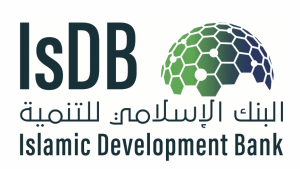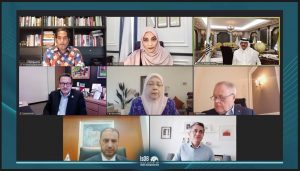Crucial for Islamic and developing countries to work together with the IsDB to build capacity and pool resources
BY KHIRTINI K KUMARAN
The Islamic Development Bank (IsDB) organised a webinar on Role of Locally Developed Innovation and Technology Transfer in Strengthening health Industry in Developing Countries on March 25, 2021, aimed at highlighting successful experiences and key enabling factors for developing local research & development (R&D) and manufacturing capacity to strengthen health systems.
 Inaugurated by IsDB President Dr Bandar Hajjar, the event was in conjunction with the virtual signing ceremony for transforming IsDB Regional Office in Kuala Lumpur into a Centre of Excellence.
Inaugurated by IsDB President Dr Bandar Hajjar, the event was in conjunction with the virtual signing ceremony for transforming IsDB Regional Office in Kuala Lumpur into a Centre of Excellence.
The launch witnessed a Memorandum of Understanding (MoU) and supplementary agreement between the Malaysian government and IsDB. It is mandated to promote cooperation on Islamic finance, halal initiatives, science, technology and innovation (STI) ecosystems, reverse linkages for capacity sharing and resource mobilisation.
The virtual launch ceremony was followed by a STI webinar. It included welcoming remarks from Senior Advisor to the President on STI and Supervisor, Communities Outreach Division Dr Hayat Sindi and keynote statements from Minister of Science, Technology and Innovation Khairy Jamaluddin and Minister of Health (MoH) Datuk Sri Dr Adham Baba.
The STI webinar hosted a roundtable discussion about lessons learnt from the Covid-19 pandemic regarding the global health supply chain’s fragility. It was discussed how successful global partnership models could play a vital role in mitigating this challenge by leveraging innovative local solutions to support local production capacity.
Vaccine supply inequity
In his keynote statement, Dr Adham shared: “The Ministry of health has benefitted from the collaboration with international organisations such as the World Health Organization (WHO), the Organisation of Islamic Cooperation (OIC) and IsDB over the years.
“There have been numerous meetings and capacity development programmes with member countries of the organisation. Such programmes have strengthened health measures to establish security in the global value chains of diagnostics, therapeutics and vaccines, which are important as we combat Covid-19.”
He further shared the pandemic response initiative and innovations set up by the Malaysian government and the MoH.
“Given that the world is at risk of being exposed to other pandemics in the future, through the National Science Council, the National Vaccine Development roadmap was Drafted as the long-term plan for Malaysia to manufacture vaccine locally,” said Dr Adham.
Sharing his experience in procuring the Covid-19 vaccines, Khairy noted there was inequity when it came to vaccine supply.
“Developed countries, whose companies have manufactured these vaccines, have cornered much of the initial supplies.
“This is a huge wake-up call for not just Islamic countries but the developing countries as well. This tremendous inequality has been laid bare by the pandemic and resulted in every man for himself synDrome throughout the world,” added Khairy.
Applauding IsDB for the Covid-19 vaccination fund that will be utilised by the IsDB member countries, Khairy said: “It is crucial to call on countries, especially in the Islamic world and the developing world, together with IsDB, to work together to build the capacity to pool the resources.”
 Tackling health issues
Tackling health issues
Several key renowned panellists participated in the roundtable. Among them were Dr Sergio Carmona, Acting CEO and Chief Medical Officer, Foundation for Innovative New Diagnostics (FIND); Prof Datuk Dr Asma Ismail, president of the Academy of Sciences; and Leonard Ariff Abdul Shatar, Group Managing Director of Duopharma Biotech Berhad.
Alan Donnelly, Executive Chairman Sovereign Sustainability and Development and Convener of the G20 Health and Development Partnership, moderated the session. The discussions covered STI policy framework and experience in developing STI ecosystems to promote local innovations and technology transfer and strengthen health capacity in Malaysia, focusing on combating Covid-19.
Regarding tackling health issues in the digital age, Dr Asma emphasised the need for resilient and agile measures and policies to be put in place.
“We need an agile and adaptive law, regulation and policies, with advancements such as artificial intelligence, blockchain and so on,” said Dr Asma.
“The medical acts, laws and regulation in the country have got to keep up with these advancements in technology.”
She also said there was a need to know what’s going on in the country in real-time and track and predict what was going to happen.
“So, it is crucial for us now to set up a robust, solid surveillance system that basically enables people to detect these pathogens, organisms or viruses as they come in real-time.
“More importantly, it is important to make these data and information available for equitable sharing to scientists, researchers in the country and to the public and private sectors for research and development (R&D) and innovations.”
Preparedness is key
Presenting on building local capacity and the local research and development capacity, Leonard Ariff stated: “In terms of technology transfer, it is important to look and see what technologies are available. We should try to get access to some of that technology and build on it, rather than trying to establish everything from scratch.”
Duopharma Biotech, he shared, became the first pharmaceuticals company in Malaysia to conduct a full-scale biologic clinical trial in Malaysia for erythropoietin (ePO) production.
“We started off with an equity investment with a Korean company to fast track the technology transfer and then went into a joint clinical trial, which we funded. We then started selling the finished product, imported from Korea, in Malaysia.
“The next step we took was to actually establish a fill-and-finish facility, the first of its kind in Malaysia. We then imported the Drug substance from Korea, to be filled in Malaysia.”
He also noted there was a considerable effort by the MoH. “They assisted greatly in ensuring that we didn’t make any mistakes as well as taking the risk in ensuring that some of these products could be localised to Malaysia over time.”
In terms of the pandemic, he said: “We need to accept that this will continue to happen. So, preparedness is key.”
He, however, noted while it was extremely tempting to put out facilities globally, in response to pandemic preparedness, it came with the price of multiple white elephants all over the world after the pandemic passes.
“I think governments and private companies will have to go in with eyes open and figure out unique types of financing models that allow these facilities to continue being able to operate even when we don’t have a pandemic.” — The Health








